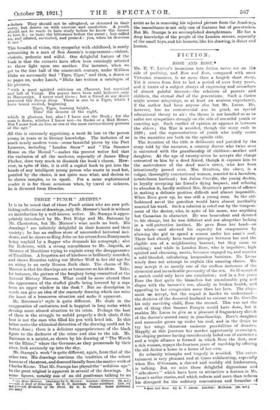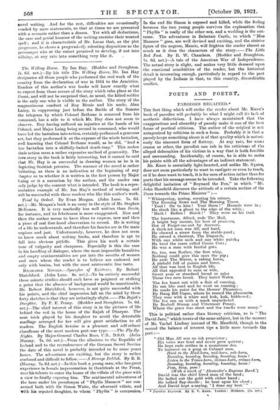FICTION.
ROSE AND ROSE.*
MB. E. V. Lreas's incursions into fiction never err on the side of prolixity, and Rose and Rose, compared with most Victorian romances, is no more than a longish short story. Yet it covers from first to last a period of over forty years, and it treats of a subject always of engrossing and nouwdays of almost painful interest—the relations of parents and children, the eternal duel of the generations. Such a choice might arouse misgivings, or at least an anxious expectancy, if the author had been anyone else but Mr. Lucas. He, however, has no controversial axe to grind, no special educational theory to air : the theme is not handled so as to enlist our sympathies strongly on the side of resentful youth or exacting age. Such conflict of opinion as appears is between the elders ; the War is avoided, though the story ends in 1920; and the representatives of youth who really count in the narrative are both on the spindle side.
The iteration of the title is deliberate and justified by the story told by the narrator, a country doctor who twice over is entrusted with the guardianship of children—mother and daughter. At the age of twenty-seven he accepts the charge entrusted to him by a dead friend, though it exposes him to the malevolence of the dead man's sister, who has been intentionally passed over. Mrs. Stratton, the sister, is a vulgar, thoroughly conventional woman, married to a harmless, invertebrate husband ; but Julius Greville, the young doctor, in loyally accepting his friend's dying bequest, and refusing to abandon it, hardly realized Mrs. Stratton's powers of offence in making a delicate position difficult and almost impossible. When Rose grew up, ho was still a young man. In the old- fashioned novel the guardian would have almost inevitably married his ward. Such a solution is ruled out by the tempera- ment of the doctor, who, in spite of his name, was anything but Caesarian in character. He was benevolent and devoted to his charge, but he was diffident and not altogether lacking in a self-protective instinct. He gave Rose her head—on the whole--and showed his capacity for compromise by allowing the girl to spend a season under her aunt's roof. There had already been tender passages between her and the eligible son of a neighbouring baronet, but they came to nothing ; and while in London Rose, who is impulsive, high spirited and charming, meets, becomes engaged to, and marrics a cold-blooded, calculating, humourless barrister. Mr. Lucas wisely does not attempt to explain this amazing choice. Wu may accept it as merely one of the endless instances of the elemental and ineradicable perversity of the sex. So ill-assorted a match could only have one conclusion ; and in a few years Rose the first quits the blameless but unendurable prig and elopes with the baronet's son, already in broken health, and appealing to her compassion more than her love. The elOpe- ment we accept, but the sequel is harder to understand— the decision of the deserted husband to entrust to Dr. Grovillo his only surviving child, Rose the second. This was not the sort of thing that Soames Forsyto would have done, but it enables Mr. Lucas to give us a pleasant if fragmentary sketch of the doctor's second essay in guardianship. Rose's daughter and namesake grows up under his roof, and in the desire to try her wings threatens ominous possibilities of disaster. Happily at this juncture her mother opportunely re-emerges, the eloping partner having considerately faded out of existence ; and a triple alliance is formed in which Rose the first, now a rich woman, repays the fourteen years of wardship by offering the old doctor a home in a house of her own.
So urbanity triumphs and tragedy is avoided. The enter- tainment is very pleasant and at times exhilarating, especially when Mrs. O'Gorman, a shrewd and worldly old Irishwoman, is talking. But we miss those delightful digressions. and " side-shows " which have been so attractive a feature in Mr. Lucas's earlier stories, and which redeem and more than redeem his disregard for the ordinary conventions and formulae of
• -Bose and Bose. By E. V. Lucas. London : Hetluien. 10s. net.?
novel writing. And for the rest, difficulties are occasionally evaded by mere statements, so that at times we are presented with a scenario rather than a drama. Yet with all deductions, the ease and genial humour of the writing exercise their wonted spell ; and it is characteristic of Mr. Lucas that, as the plot progresses, he shows a progressively relenting disposition to the personages who at the outset promised to develop, if not into villainy, at any rate into something very like it.







































 Previous page
Previous page